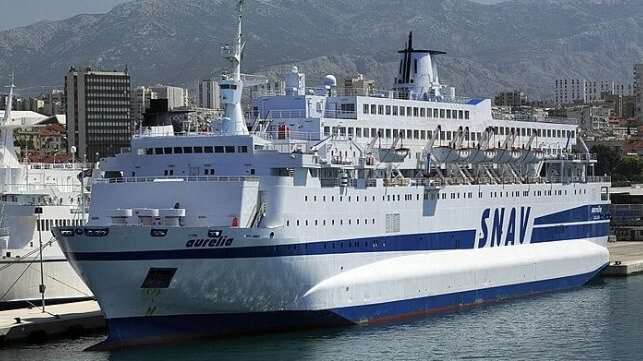Dutch Plan to Use Ferries to House Refugees Suffers Setbacks

The Dutch government has suffered another setback in its already widely criticized plan to use chartered ferries or cruise ships to help alleviate the overcrowding in refugee centers across the country. After initially announcing the plan last week, it has been met with a barrage of critics both from residents and local government to aid organizations, yet at least one of the ships is believed to already be sailing to the Netherlands due to start its role as a floating accommodations center next week.
The local council in the municipality of Zaanstad near Amsterdam today withdrew its permission to dock one of the chartered ferries at their pier. City officials said the 21,500 gross ton ferry, Aurelia could not be accommodated at their facilities. They said the 42-year-old ferry registered in Cyprus would produce “too much nitrogen,” and that under the regulations the port would not be able to handle the pollution coming from the ship. In May, the local council had said it was looking into the idea of accepting a ship to address the housing crisis.
Similarly, the port of Vlissingen had also been suggested as another location for one of the vessels. The southern city near the border with Belgium however this week said that it would not be able to accept one of the vessels. Residents had demanded that the city government reject the ship after the widespread criticism of the plan in recent days.
The Dutch government, however, has called the current situation an asylum crisis. The country has accepted an estimated 40,000 refugees from Ukraine in addition to other nationalities that have sought refuge in the country. Reports indicate that the centers are overflowing across the country unable to provide shelter for some of the new arrivals. One report said people are sleeping outside at least one center on the lawn with no shelter from the elements.
Last week, Eric van der Burg, a justice minister who is charged with dealing with refugees, was quoted in the media saying that they had come up with the idea of chartering three vessels, which he referred to as cruise ships, to temporarily house a few thousand of the refugees. Asked where the ships would dock he said that was still under discussions suggesting that the ships might be anchored offshore. He said they were exploring using shuttle services to transport the residents to shore but still aid groups compared the plan to imprisoning the people. An aid group described the idea of placing asylum seekers offshore as absurd.
The minister said last week that the government had already chartered the vessels and that they were heading to the Netherlands. He said they had acted quickly to ensure the availability of the vessels. The AIS signal for the one vessel that was identified for the program, the Aurelia, shows that it is docked in Marseille, France but was expected to depart for Spain and presumably continue on to the Netherlands.

that matters most
Get the latest maritime news delivered to your inbox daily.
In April, city officials in the Netherlands chartered a Holland America Line cruise ship as one of their first temporary housing locations along with two river cruise ships from AmaWaterways. The charter for the Holland America Volendam was extended through the summer but the cruise line reports the vessel will not extend the charter and will return to cruising in late September.
Other countries have also turned to the use of ferries to accommodate some of the influx of people. Estonia chartered a ferry in the spring and recently another one arrived in Scotland. Groups in Scotland also criticized the effort for the small size of the cabins, but the shipping company responded by saying that the people accommodated aboard would also have the use of the lounges and public spaces. Estonian officials in the spring said the ships worked well with the public spaces and meeting rooms providing the ability to provide counseling and services aboard the ship and the cafeterias or restaurants made it possible to provide basic meal services.
(Top photo by Falk 2 - CC BY-SA 4.0 license)
